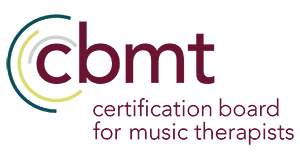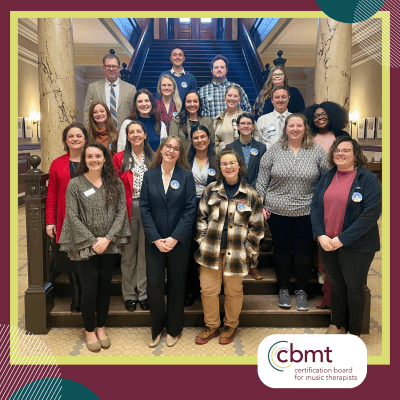Regulatory Affairs: On the Front Lines
Most of us don’t think of music therapists as activists, but we have a few we’d like to introduce you to. First, though, why is advocacy important in music therapy? Because regulation and policy impacts everything about what you do – and those changes can either benefit you and your practice, or not.
As both the healthcare and education ecosystems continually adapt to changing priorities, it’s important to understand that music therapy is a vital part of both systems and not immune to these changes. It’s essential that we protect and champion our field to minimize changes that negatively impact our important work as music therapists.
Since 2005, the Certification Board for Music Therapists (CBMT) and the American Music Therapy Association (AMTA) have collaborated on a national initiative known as “The State Recognition Operational Plan.” To elevate the understanding and utilization of music therapy in its myriad clinical applications, CBMT and AMTA have mapped out and executed an advocacy plan resulting in the creation and support of music therapy task forces in 48 states and the US territory of Puerto Rico.
The staff at the center of this movement include Dr. Dena Register, Regulatory Affairs Advisor, and Dr. Kimberly Sena Moore, Regulatory Affairs Associate, from CBMT, and Judy Simpson, Director of Government Relations from AMTA.
To date, the collective efforts of this national team, more than 300 MT-BCs who serve on task forces, and the advocacy of thousands of music therapists and students have resulted in formal recognition of the credential by 18 states through licensure, state certification or title protection.
That’s why it’s important to stay on top of what is happening in your state – and get involved.
State Activists: Boots on the Ground
Meet some of our current and former state activists. They can serve as a link for you to get involved or just stay in the know – or they can point you to the right contact you can be in touch with.
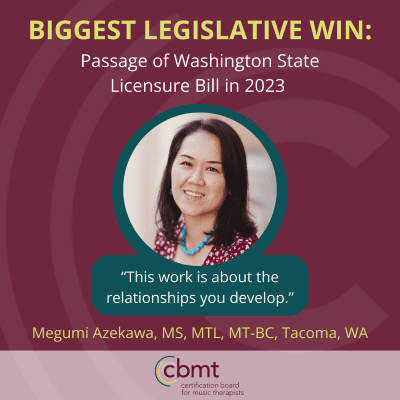
Megumi Azekawa, MS, MTL, MT-BC, Tacoma, WA
Founder and Director, Puget Sound Music Therapy, LLC
PhD student, School of Nursing, University of Washington
BIGGEST LEGISLATIVE WIN: Passage of Washington State Licensure Bill
“It is our ethical responsibility to protect the consumers from potential harm by promoting what music therapy really is and how it really works and benefits,” Megumi said. “Over the years, I developed productive relationships with several legislators through Hill Day, Town Hall meeting visits, and individual meetings to discuss our bills…and we’ve gained many “friends” in the Washington state legislature who truly support music therapy. I’ve witnessed our local field grow steadily by adding more full-time music therapy positions, and more successful private practices have been happening thanks to all our colleagues’ tireless efforts.”
Read more about Megumi here.
Stephanie Johnson, MT-BC, Cedar Rapids, IA
Neurologic Music Therapist – Fellow
CEO, Music Speaks, LLC (CA, NE, MN, IA, WI, IL, TN and NC)
BIGGEST LEGISLATIVE WIN: Passage of Music Therapy Title Protection in Iowa
“One commonality I can always predict is that music therapists desperately want the public to understand what we do,” Stephanie explains. “I know the motivation is there, but fear of the unknown gets in the way of action. If I could share that it’s the small moments of advocacy that make the difference, not big moments, perhaps there would be less fear of stepping in. Many hands make light work,” she says.
Read more about Stephanie here.
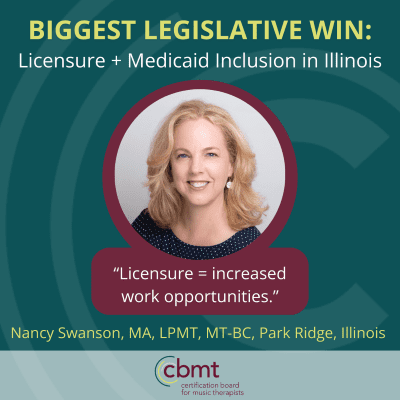
Nancy Swanson, MA, LPMT, MT-BC, Park Ridge, Illinois
Licensed Professional Music Therapist
Northshore Music Therapy, Inc
BIGGEST LEGISLATIVE WIN: Passage of Licensure + Medicaid Inclusion in Illinois
“As a child, my grandmother would take me to the Red Cross with her every Sunday to set up the room for the week’s blood drive. She lived a life of service and instilled that in me. The dedication that Judy Simpson, Dena Register, Kimberly Sena Moore and our Illinois team all possess inspires me and keeps me asking myself: What’s next?!”
Read more about Nancy here.
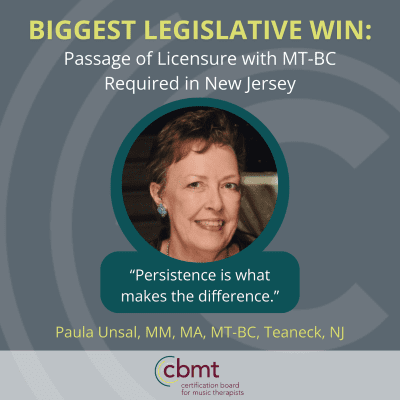
Paula Unsal, MM, MA, MT-BC, Teaneck, NJ
Adjunct Faculty, Montclair State University, Montclair, NJ
BIGGEST LEGISLATIVE WIN: Passage of Licensure with MT-BC Required in New Jersey
“Remaining steadfast and trusting in the process through the inevitable disappointments,” Paula cites as the most important thing. “Persistence is what makes the difference.”
Read more about Paula here.
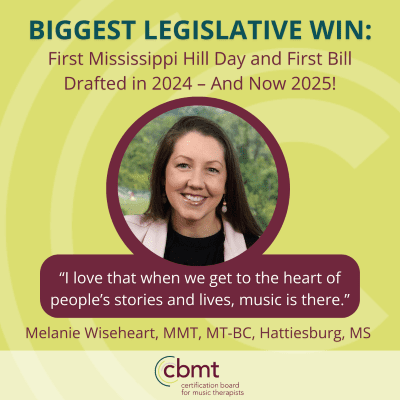
Melanie Wiseheart, MMT, MT-BC, Hattiesburg, MS
Assistant Professor of Music, Coordinator of Music Therapy
William Carey University
BIGGEST LEGISLATIVE WIN: First Mississippi Hill Day and First Bill Drafted in 2024 – And Now 2025!
“It’s easy to think of advocacy as slow, difficult work (and it is!), but when I hear that Washington succeeded in doing this, and Illinois had that big win, etc., it motivates me to stay engaged in the process. We have legislation being introduced in around 10 states this year, right? I would love to know more about what is going on in those states! If I don’t live in that state, maybe I have friends or family in that state who can contact their legislators.”
Read more about Melanie here.
CBMT and AMTA: Partnering Nationally on Regulatory Affairs Advocacy
The “national team,” which includes staff members who work for CBMT and AMTA, coordinates task forces, composed primarily of MT-BCs and students, in most states across the nation to further the primary objective in each individual state. The national team currently includes:

Dr. Dena Register, CBMT Regulatory Affairs Advisor
As a seasoned music therapy clinician, educator and consultant, Dena’s advocacy work in the U.S. focuses on the recognition of music therapy by state governments and the acknowledgment of the MT-BC credential.
As part of her international work, she was awarded a Council for International Exchange of Scholars Fulbright Scholar award to consult with Mahidol University in Bangkok, Thailand. She helped develop and launch clinical music therapy programs in local hospitals, palliative care units and rehabilitation facilities, along with the first music therapy master’s degree program in Southeast Asia at the MU College of Music.
Dena is a Chopra-certified meditation teacher, and enjoys leading meditation and sound healing practices at the Chopra MindBody Zone in Orlando, Florida.

Dr. Kimberly Sena Moore, CBMT Regulatory Affairs Associate
As Associate Director of the Bower School of Music at Florida Gulf Coast University, Kimberly is an Associate Professor and Coordinator of the Music Therapy program. Her research focuses on emotion regulation development, particularly in preschoolers who are neurodevelopmentally at-risk, as well as clinical music intervention development. She also serves as Co-Editor for the Journal of Music Therapy.
Outside academia, Kimberly is involved in state-level advocacy, legislative, and policy issues that impact music therapy practice. She has presented extensively at regional, national, and international conferences, and her research has been published in the Journal of Music Therapy, Music Therapy Perspectives, Arts in Psychotherapy, the Nordic Journal of Music Therapy and Frontiers in Human Neuroscience. Her work has been featured in media outlets such as Psychology Today, Redbook and CURE.
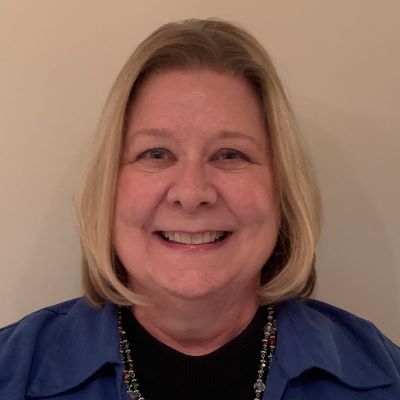
Judy Simpson, AMTA Director of Government Relations
For two decades, Judy has led AMTA’s national state recognition initiative in collaboration with CBMT, representing the music therapy profession with legislators, agencies, and coalitions on the state and federal level. She has presented and participated in advocacy trainings and events in 30 states and has contributed to legislative and regulatory language in 41 states, supporting increased access to quality music therapy services by qualified board-certified music therapists.
She is the co-author of “Music Therapy Reimbursement: Best Practices and Procedures” and provides reimbursement guidance to AMTA members and music therapy consumers. She holds a Managed Care Professional designation from America’s Health Insurance Plans (AHIP).
Before AMTA, Judy’s 17 years of clinical experience as an MT-BC involved developing music therapy programs in hospital settings, including physical rehabilitation, oncology, labor and delivery, behavioral health, ICU and general medicine.
Celebrating the Wins
There have been so many wins to celebrate over the years that the list would never fit here. Big “wins” in the last three years include:
- Inclusion of music therapy services for Medicaid recipients in Illinois (2024)
- Licensure passed in Illinois (2022), Ohio (2023), Connecticut (2023), and Washington (2023)
- State Certification established in Tennessee (2024)
- Invited to participate in the Sound Health Music as Medicine workshop panel in December 2023, hosted by the National Institutes of Health (NIH) and co-chaired by Dr. Francis Collins and Renee Fleming
Some of the biggest wins – as many have stated – are the relationships that have developed among the MT-BCs at the state and national level.
Making Lifelong Connections
Getting involved in advocacy can forge meaningful, lifelong connections. Many MT-BCs work in isolation from others in the field. Fortunately, there are conferences for music therapists where you can get to know other state task force members and a host of other MT-BCs in your region. Fostering connection and relationships is probably the most important step we can take as music therapists to ensure that our field remains healthy, effective and strong.
The American Music Therapy Association (AMTA) has seven (7) regions and the American Music Therapy Association for Students (AMTAS). AMTA hosts national conferences and online symposiums. Each of the regions hosts their own conference in the spring between February and April, generally. Additionally, the AMTA student organization, AMTAS, holds Passages conferences at the national and their respective regional professional organizations’ conferences. The regions include:
- Southeastern region
- Mid-Atlantic region
- Northeastern region
- Midwestern region
- Great Lakes region
- Western region
- Southwestern region
There is also a national online symposium organized by the American Music Therapy Association (AMTA).
CBMT is invested in important work maintaining the validity and viability of your MT-BC credential. Whether it’s conducting MT-BC surveys to update the exam, working with committees of MT-BCs on continuing education, or doing this all-important advocacy work in the states, we are working hard to serve our MT-BC community – and we encourage your involvement. Working together on common goals is what cements us as a community of MT-BCs.
If you want to get involved, simply reach out to your state’s task force. For all the information you need, click on your state in the map located here. Feel free to contact any member of the national team as well.
CBMT has more information about advocacy and state recognition on our website. Visit cbmt.org to learn more about CBMT’s role in the field of music therapy.
